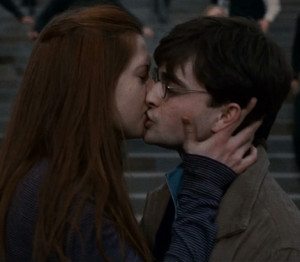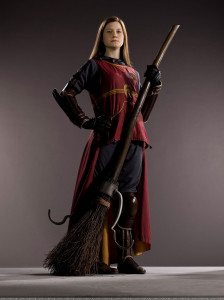Tete a tete: Is Ginny Weasley a strong character or a shallow placeholder?
[dropcap]I[/dropcap] s Ginny Weasley a strong female character and major part of the Harry Potter series or is she just a shallow placeholder who is there more for convenience than anything else? Two Books writers go head-to-head.
Ginny is “the epitome of a shallow placeholder”
As a true Potterphile, who can quote from any book and film, I find it difficult to understand how anyone can criticize Harry Potter. As a result my opinion of Ginny Weasley is not one that I am happy about and yet I cannot deny that, for me, she is the epitome of a shallow placeholder.
[pullquote style=”right” quote=”dark”]She is defined only as being Ron’s little sister who has a shallow teenage crush on Harry[/pullquote] From the first to the fifth book, Ginny barely makes an appearance and so, at this point, she cannot even be called a placeholder. Granted, she is a major plot device in the Chamber of Secrets but because we do not find out that it was Ginny who almost allowed Voldemort to be resurrected until the end of the series her character is not fully fleshed out. Perhaps from this point on, Rowling could have incorporated Ginny into the story more but quite the opposite happened. She seems to disappear in the third and fourth books, especially as Harry is lusting after Cho Chang and he has not yet formed any real friendship with Ginny.
Then suddenly, in the fifth book, we learn of Ginny’s brilliance: she is funny, stunningly beautiful and a talented Quidditch-player. All this happens so quickly that it does not really feel like she has developed into this person. Instead it just seems like Rowling realised, a little too late, that this potential love interest for Harry was greatly lacking in personality attributes. To solve this, she immediately gave Ginny all of these positive qualities, morphing her into a more three dimensional character but in a way that is not very believable.
Many people say Ginny is a well-developed character with a major role to play and so she deserves the importance she gains. After all, she was a loyal member of Dumbledore’s Army, a valued part of the Gryffindor Quidditch team and she is intelligent and witty. The problem is that this is not enough and, even if it is, it all comes too late. These aspects of her character do not develop, they just suddenly appear without any previous knowledge of her abilities. Then, when these skills are developed later in the series, such as when she takes on the running of the DA, we do not witness it first-hand because Harry is not at Hogwarts, and so we never get to see her growing and maturing, making it difficult to award depth to her character.
 The majority of other female characters (excluding Pansy Parkinson) are easy to view as a match for Harry because they have more depth and complexity. Luna is a good match because she is quirky and interesting, as well as the fact Harry felt comfortable enough around her to ask her to Slughorn’s party. Hermione would also have been a realistic choice, Rowling even admitting they would make a good pair, particularly because we know Harry admires her skills and intelligence. Even Cho is more understandable than Ginny since Harry’s crush on her builds up over several books. Ginny is the easy, contrived and clichéd way out. It makes for the uncomplicated, fairytale ending because Harry finally gets a real family in the form of the Weasleys. Still feel that Ginny and Harry are a good match? Hypothetically, imagine there is another Weasley girl in Harry’s year who is equal in terms of character to Hermione or Luna. Surely Harry would have chosen her over Ginny because the latter lacks a defined personality.
The majority of other female characters (excluding Pansy Parkinson) are easy to view as a match for Harry because they have more depth and complexity. Luna is a good match because she is quirky and interesting, as well as the fact Harry felt comfortable enough around her to ask her to Slughorn’s party. Hermione would also have been a realistic choice, Rowling even admitting they would make a good pair, particularly because we know Harry admires her skills and intelligence. Even Cho is more understandable than Ginny since Harry’s crush on her builds up over several books. Ginny is the easy, contrived and clichéd way out. It makes for the uncomplicated, fairytale ending because Harry finally gets a real family in the form of the Weasleys. Still feel that Ginny and Harry are a good match? Hypothetically, imagine there is another Weasley girl in Harry’s year who is equal in terms of character to Hermione or Luna. Surely Harry would have chosen her over Ginny because the latter lacks a defined personality.
Having read (and reread) the Harry Potter series several times, I still feel Ginny’s character is not strong or conveyed realistically to the reader, and she definitely should not have been the one who ends up marrying the hero of the whole series.
Karishma Jobanputra
In Defence of Ginny – she is “one of the most universally recognisable characters”
Ginevra Molly Weasley does not have a particularly endearing reputation. From serious discussions within the Potterhead community to less strenuous ones among casual fans, the youngest Weasley child is not the most popular person in the Harry Potter universe. It does not help that film Ginny, who is most people’s go-to version, is an inadequate representation of an already secondary character.
[pullquote style=”right” quote=”dark”]Unlike what some people think, Ginny is more than just a pretty placeholder[/pullquote] I think this is a great shame because book Ginny is fantastic. I would never say she is flawless but I do think that she gets a lot of unfair criticisms, many of which are either hypocritical since other, well-loved characters harbour the same traits, or trivial and not worth dwelling on.
The one problem people seem to have with our beloved red-head is that she is “boring”. I am not quite sure how someone who has experienced possession by Lord Voldemort, as well as being a strong fighter and female character, can be classed as boring, but I can understand how a non-quirky character can feel that way in the fantastical wizarding world. The problem I have with this criticism is that people seem to think Ginny is the only character like this. For all its strengths, Harry Potter is still aimed at a young audience and, despite admirable character growth, most of the secondary characters tend to stay consistent. It just so happens that the likes of Luna Lovegood and Percy Weasley have more distinctive personalities to start off with. After all how is Ginny, consistently stable, any worse than Lee Jordan, consistently a prankster and arguably more of a placeholder?
 Ginny should be celebrated as a character. She is one of the few people who manages to remain calm and rational in difficult situations, such as when she says goodbye to Harry in the Deathly Hallows. In a series about a particularly adventurous and dangerous time within an already fantastical universe, she is also one of the most universally recognisable characters, being someone who is on the more “normal” end of the spectrum. She is very relatable, going through all the ordinary phases of being a teenager at school. She dates, has fun, learns things in class, argues with her siblings, joins a sports team and excels in it and she makes friends for life. People also seem to forget that she was one of the most prolific members of the anti-Voldemort movement within Hogwarts in the final book because all the credit was given to Neville.
Ginny should be celebrated as a character. She is one of the few people who manages to remain calm and rational in difficult situations, such as when she says goodbye to Harry in the Deathly Hallows. In a series about a particularly adventurous and dangerous time within an already fantastical universe, she is also one of the most universally recognisable characters, being someone who is on the more “normal” end of the spectrum. She is very relatable, going through all the ordinary phases of being a teenager at school. She dates, has fun, learns things in class, argues with her siblings, joins a sports team and excels in it and she makes friends for life. People also seem to forget that she was one of the most prolific members of the anti-Voldemort movement within Hogwarts in the final book because all the credit was given to Neville.
Some dissenters also seem to have a problem with Ginny ending up with Harry, arguing that their relationship was just a teenage fling and the ending is unrealistically idyllic. I have some problems with the overly saccharine quality of the epilogue myself, but targeting Ginny alone is unwarranted. While Hermione and Ron did spend a significant amount of time in each other’s company throughout the seven books, all the other final pairings, like Neville and Hannah Abbott or George Weasley and Angelina Johnson, are results of that same childish obsession with a “happily ever after”. It just so happens that Ginny’s is more noticeable.
I am sure that there are people who will continue to dislike Ginny. At the end of the day, characters are meant to divide opinion and stir up debate, the way that someone like Snape seems to have a loyal, obsessive fan-base despite being a revolting creature. All I want to say though is, if you want to pick on her flaws, at least choose ones that are actually problems.
Ibtisam Ahmed

Comments (1)
Joanne makes a mockery of their heroes.
Fans should make Joanne loving their heroes.
http://newreal.org/
Oldest profession for oldest newspaper.
Guardian banned in the comments Announce article “Joan and Harry.”
Newspaper allows freedom of speech only for billionaires.
In the Guardian says about freedom of speech only when destroying laptops journalists from Guardian.